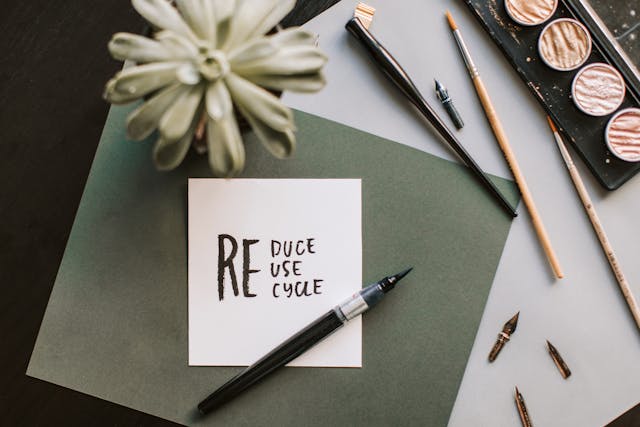Miami, with its vibrant culture and sunny weather, is an exciting place to call home. However, like many bustling cities, it faces a growing challenge: waste management. With millions of residents and tourists, the city’s landfills see an overwhelming amount of waste, much of which could be avoided. If you’ve recently moved to the city, this could be the perfect opportunity to adopt a zero-waste lifestyle and contribute to a cleaner, greener city.
This article will guide you through simple, practical steps to reduce waste while settling into your home, helping you build sustainable habits that can last a lifetime.
Declutter Before You Move to Avoid Waste
One of the most important steps you can take toward a zero-waste lifestyle starts even before you move. Decluttering your belongings before the move helps reduce the amount of stuff you bring into your new home, lowering your chances of generating unnecessary waste. Many of us tend to hold on to items we no longer use, and moving is a great time to reassess what’s truly important.
Consider donating clothes, books, and household goods to local charities or thrift stores. Not only does this reduce waste, but it also helps others in the community. The less you move with, the easier it will be to stay organized in your new home—and you’ll also feel good knowing you’ve reduced waste in the process.
How a Moving Company Can Help Simplify Your Move
Choosing the right moving company can make the process of settling into your new home much smoother. While you focus on starting fresh, a reliable local Miami moving company can handle the heavy lifting, helping you transition more efficiently. Many movers offer a range of services, from packing and unpacking to securely transporting your belongings. Even if you’re unsure whether they offer eco-friendly services, you can ask about their practices, such as reusing packing materials or recycling options. By discussing your preferences with the company, you can ensure your move aligns with your sustainability goals, making the process more convenient and tailored to your needs.
Choose Sustainable Packing Materials
When preparing for a move, it’s easy to fall into the habit of buying large amounts of bubble wrap, plastic bags, and single-use boxes. However, opting for sustainable packing materials is a key step in transitioning to a zero-waste lifestyle. There are many eco-friendly alternatives available that can keep your belongings safe without contributing to environmental harm.
Consider using recycled cardboard boxes, which can often be sourced from local stores or recycling centers. You can also use old towels, blankets, or clothing to cushion fragile items instead of bubble wrap or plastic foam. When it comes to securing your boxes, look for biodegradable packing tape, which is just as effective as traditional plastic tape but far better for the environment. After unpacking, be sure to recycle or reuse these materials instead of discarding them, and encourage others to do the same.
Unpack Thoughtfully to Minimize Waste
The process of unpacking is often when the most waste is generated. It’s tempting to rip open boxes, toss the packaging aside, and focus on settling in. However, being mindful during this stage can significantly reduce the amount of waste that comes from a move.
As you unpack, take your time to reuse or recycle as much as possible. If you have cardboard boxes, set them aside for recycling or consider offering them to neighbors who may be planning a move. Bubble wrap, packing peanuts, and plastic wrap should be saved for future use instead of thrown away. You can also find local recycling centers that accept various packing materials for proper disposal. By staying conscious of how you unpack, you prevent excess waste from piling up.
Reduce Energy and Water Waste in Your New Home
Transitioning to a zero-waste lifestyle involves more than just reducing physical waste—it’s also about conserving valuable resources like energy and water. Start by replacing old, inefficient appliances with energy-efficient models. Appliances with Energy Star ratings consume less electricity, saving you money on your bills while lowering your carbon footprint.
When it comes to water conservation, consider installing low-flow showerheads and faucets to reduce water waste. These simple changes can help make your home more sustainable and contribute to a larger goal of reducing resource waste in everyday life.
Embrace Reusable Items to Replace Single-Use Products
A major contributor to household waste comes from single-use products, many of which are used once and then thrown away. Plastic bags, paper towels, disposable cups, and plastic utensils are common culprits. However, transitioning to a zero-waste lifestyle means embracing reusable alternatives that can be used over and over again.
Start by swapping plastic bags for reusable cloth bags when shopping. Switch from disposable paper towels to washable cloth towels and invest in reusable water bottles and coffee cups. In the kitchen, consider using glass containers or silicone food storage bags instead of plastic wrap or sandwich bags. These small changes make a significant difference over time, drastically reducing the amount of waste generated in your home.
Sustainable Habits for Long-Term Zero-Waste Success
Maintaining a zero-waste lifestyle requires consistency and commitment, but the rewards are well worth it. To ensure long-term success, start by incorporating small, sustainable habits into your daily routine. For example, set up a designated space in your home for sorting recyclables and compostables. Make it a habit to bring your reusable bags and containers when you go shopping or out to eat. Over time, these actions will become second nature, and you’ll find it easier to maintain your zero-waste efforts.
It’s important to remember that no one is perfect, and transitioning to zero-waste is a gradual process. Focus on making progress rather than perfection, and celebrate small victories along the way. As you continue to build these habits, you’ll reduce your environmental impact while enjoying a more mindful and sustainable lifestyle.
Transitioning to a zero-waste lifestyle after your move is not only achievable but also empowering. From decluttering before you move to embracing sustainable practices in your new home, each small step contributes to a larger environmental impact. Whether it’s reducing energy consumption, eliminating single-use products, or seeking help from a sustainable moving company, every action counts.
By adopting these practices, you can make a meaningful difference for both your household and the planet. The journey to zero-waste may take time, but it offers long-term rewards, including a cleaner environment, reduced waste, and a greater sense of accomplishment. Start your journey today, and take pride in knowing that you’re contributing to a greener world, one sustainable choice at a time.




